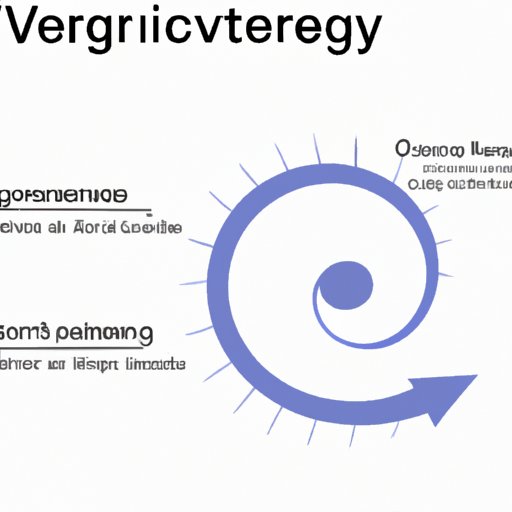
Introduction
Vertigo is a type of dizziness that creates a sensation of spinning or whirling, making it difficult to maintain balance. It is a common ailment characterized by a range of symptoms with varying degrees of severity. Understanding the duration of vertigo without treatment is crucial because it can help in determining the appropriate treatment and the potential impact on the patient’s overall life.
The Duration of Vertigo Without Treatment: A Comprehensive Guide
Vertigo’s duration without treatment can vary based on different factors, such as the type of vertigo, its underlying cause, and the affected person’s overall health. The severity and frequency of the symptoms may range from mild to severe. Below is a comprehensive guide to the different types of vertigo, and their respective durations when left untreated.
Different Types of Vertigo and Their Duration
There are two main types of vertigo: Peripheral and Central. Peripheral vertigo is caused by inner ear problems, while Central vertigo is due to a problem in the brain or spinal cord. The following are the different types of vertigo and their duration:
- BPPV (Benign paroxysmal positional vertigo) – lasts for a few seconds to a few minutes
- Labyrinthitis – can last for several weeks
- Vestibular Neuritis – usually lasts a week to 10 days.
- Meniere’s disease – can last between 20 minutes to 24 hours. The return can last for days.
General Timeline of Vertigo Without Treatment
The duration of vertigo varies from person to person, and each type can present differently. In general, vertigo can last anywhere from a few seconds to several weeks. Most dizziness episodes associated with vertigo last less than a minute. However, some people end up experiencing episodes that last all day and can come and go over several weeks or months.
Factors That Affect the Duration
The duration of vertigo can depend on several factors, including the underlying cause, the patient’s overall health, and their age. The severity of the symptoms and whether they seek treatment or not also play a vital role in determining the duration and potential outcomes of the illness.
Understanding the Natural Course of Vertigo: How Long Does it Last Without Treatment?
Causes of Vertigo
The inner ear is responsible for maintaining balance and equilibrium, which makes it an essential part of the body. If there are problems with the ear’s vestibular system, it can lead to vertigo. Other factors can contribute to vertigo, including infections, head injuries, and certain medications.
Symptoms and Progression of Vertigo
The symptoms of vertigo range from mild to severe, and they can make life challenging for those who experience them. Common vertigo symptoms include dizziness, a spinning sensation, nausea, vomiting, headaches, and loss of balance. The symptoms can progress over time and leave affected individuals feeling fatigued and anxious.
How Long Vertigo Can Last Without Treatment
The duration of vertigo can vary from one person to another and depends on various factors such as the underlying cause and severity of symptoms. Generally, vertigo is self-limiting and can resolve itself naturally within a few weeks or months. In some cases, vertigo can become chronic, where the patient experiences symptoms for a more extended period. Therefore, it is essential to seek medical attention if the condition persists or interferes with daily life.
Living with Untreated Vertigo: Patient Perspectives on Duration and Recovery
Impact of Vertigo on Patient’s Life
Vertigo can significantly impact an affected person’s life, affecting not only their physical health but also their emotional and mental well-being. Patients described their experiences as frustrating, debilitating, and exhausting.
Coping Strategies Used by Patients
Patients use several coping strategies to deal with the symptoms of vertigo without treatment. Some use relaxation techniques like deep breathing or visualization to reduce stress and anxiety. Others choose to adjust their daily routine to avoid triggers that cause dizziness.
Factors that Affect Recovery
Factors such as age, the severity of symptoms, and the underlying cause of vertigo can affect recovery time. Patients who are younger or who experience mild symptoms often recover more quickly than those who are older or experience more severe and chronic symptoms.

Vertigo Without Medication: How to Cope with Symptoms Until they Subside
Home Remedies for Vertigo
Several home remedies can alleviate the symptoms of vertigo, such as practicing relaxation techniques, such as deep breathing exercises, staying hydrated, and getting plenty of rest. Eating a healthy, well-balanced diet and avoiding triggers can also help manage symptoms.
Lifestyle Changes to Alleviate Symptoms
Making lifestyle changes can sometimes relieve vertigo symptoms. Limiting caffeine and alcohol intake, avoiding sudden head movements, and getting enough sleep regularly are all effective methods.
Exercises Recommended for Vertigo
Some exercises can help improve balance and reduce symptoms of vertigo. These include head-turning exercises and other balance exercises that are easy to perform at home.
Why Untreated Vertigo Can Last Longer Than You Think: Insights from Medical Professionals
Reasons for Prolonged Symptoms
Vertigo can persist for longer without treatment if the underlying cause is not identified. Furthermore, certain lifestyle factors such as stress, lack of sleep, and poor dietary habits can make the symptoms worse, prolonging the condition.
Testimonials from Medical Professionals
Medical professionals recommend addressing the underlying cause and aims to relieve the symptoms to prevent persisting episodes of vertigo. They also suggest seeing a doctor if the symptoms worsen or do not go away.
The Importance of Seeking Medical Attention
Seeking medical attention can make a crucial difference in the severity and duration of vertigo symptoms. A doctor can prescribe appropriate medications or recommend specific exercises to help manage and reduce the symptoms.
The Impact of Lifestyle Factors on The Duration of Vertigo Without Treatment
Role of Diet and Nutrition
Diet and nutrition play a significant role in the severity and duration of vertigo symptoms. Consuming a well-balanced diet including vitamins and minerals can provide relief from vertigo. A diet high in sodium, caffeine or alcohol can potentially make symptoms worse.
Exercise and Physical Activity
Regular exercise and physical activity can help alleviate vertigo symptoms and improve overall health. Exercise routines, such as tai chi, yoga, or physical therapy, can potentially improve balance, coordination, and reduce dizziness episodes.
Sleep and Stress Management
Sleep and stress can both impact vertigo symptoms. Proper sleep hygiene habits such as regular sleeping hours, preparation for sleep, and avoiding caffeine and alcohol can help with vertigo. Stress management techniques like meditation, deep breathing, and visualization exercises can help manage vertigo symptoms.
When to Seek Treatment for Vertigo: An Analysis of The Factors That Can Prolong Symptoms
Indicators That Medical Attention is Needed
There are several indicators that medical attention is needed to manage vertigo symptoms, such as experiencing severe or frequent episodes, vomiting or nausea, hearing loss, and difficulty walking. Also, if the vertigo episodes start abruptly with no known cause, medical attention should be sought.
Different Treatment Options Available
Medical professionals offer different treatment options ranging from home remedies to medicines and surgeries. Medications such as anti-nausea medicines and vestibular suppressants can help alleviate symptoms. Surgery is only considered when all other treatments have failed.
The Benefits of Seeking Medical Help Early
Early medical intervention can lead to better outcomes for patients. Seeing a doctor can help identify the underlying cause of the problem and provide appropriate medication, exercise, or both to treat the condition before it becomes chronic.
Conclusion
Recap of the Article
Vertigo is a common ailment that can affect an individual’s physical and emotional well-being. The duration of vertigo without treatment can range from a few seconds to several weeks or months. Factors such as underlying medical conditions, age, and overall health can affect vertigo’s duration. Patients can use various coping mechanisms, including home remedies and lifestyle changes, to manage vertigo symptoms.
Importance of Seeking Treatment
Seeking medical attention early can help identify the underlying cause of vertigo and provide appropriate intervention to potentially relieve symptoms and prevent chronicity.
Final Thoughts and Recommendations for Dealing with Vertigo
Vertigo can be a challenging condition to manage, but there are several options available to alleviate symptoms and reduce the severity and duration of episodes. Managing lifestyle factors such as diet, stress, and exercise can also help, and patients are encouraged to seek medical attention if their symptoms persist or interfere with daily life.





